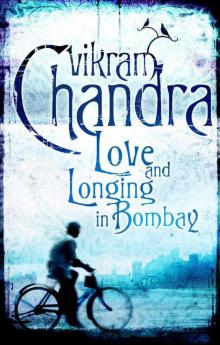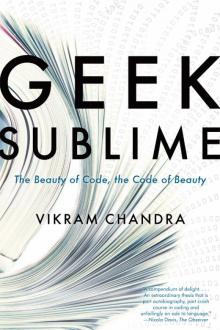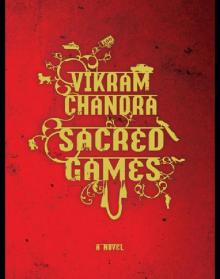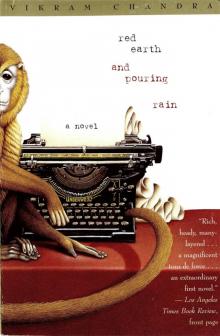- Home
- Vikram Chandra
Red Earth and Pouring Rain Page 7
Red Earth and Pouring Rain Read online
Page 7
“Come on.”
“Slam-dancing is passé.”
“Come on, shithead.” He pulled me into the circle, and instantly I was almost knocked off my feet. In a few moments I began to feel the rhythm of it and soon I was ricocheting from body to body, my eyes half-shut. It looked harsh, but it did feel good, and you could lose yourself in it. When I finally staggered out, my head spinning, my body was already starting to ache, but I could feel a smile on my face.
“Hello,” she said.
She was dressed in black again, a skirt this time, with the ubiquitous T-shirt. The red hair was pulled back tightly into a braid, leaving her face exposed. She looked very young.
“Amanda.”
“How are you?”
“Good,” I said. “Good. And you?”
“Okay. The people I came with left.”
“The girls from the hall?”
“They thought this place was gross.” She shook her head. “Gross. Assholes.”
“It is pretty seedy.”
“Pretty seedy?”
“Something like that.”
“You have a funny way of talking.”
“I come from a funny place.”
“Funny?”
Behind her, a bald head moved in the yellow light, perfectly spherical, with a curving scar caterpillaring up the lower hemisphere.
“How old are you?”
“Eighteen.”
“You like this?”
“Do you?”
I shrugged. “Do they do this in Texas?”
“Everywhere.”
I got another beer, and one for her, and we sat at a round metal table at the back, where it was so dark that all I could see was a flash when her eyes moved. There were black shapes around us, almost motionless. Listening to her voice in the darkness reminded me, for some reason, of being very young, of my friends and myself when we were at school together, of sitting up in bed, wrapped in blankets and telling each other ghost stories. I told her this and she laughed, and said that when she was very young she would lie alone in bed, eggs in both armpits, waiting for them to hatch.
“You what?”
“I thought I could make eggs hatch, so I took eggs out of the fridge and put them in my armpits when I slept, thinking maybe I’d wake and there’d be chickens. But they never did, and I guess after a while they would start to rot or something, my father would come and take them away, throw them away I guess. But I always thought I could make them hatch so I would get some more.”
“That’s a sad story.”
“They never broke though.”
“What does your father do?”
“He’s a judge. He has white hair.”
Tom came listing through the tables, leaning over bottles of beer and glasses and cigarettes, peering at the mannequin-still shapes.
“Tom.” I raised my voice over the music. “Tom.”
He slid into a chair, tilting to get a good view of Amanda’s face.
“Amanda,” he said. “Hey.”
“Hi.”
“Abhay, they’re leaving. We have to go.”
“Already?” I said, and saw the soft white of his teeth.
“You don’t have to,” Amanda said. “You can come with me later.”
“You have a car?” Tom said.
“Yes.”
“Perfect,” he said, his head turning toward me, and I picked up a butt from the table and flicked it at him. It hit him somewhere around the chest and fell to the ground.
“Asshole,” I said.
“Abhay doesn’t drive,” he said. “He wants to live in L.A. but he doesn’t want to drive.”
“Why?” she said.
“I don’t know,” I said. “I just don’t like it. It’s not like I can’t. I learnt. But I don’t like it.”
“You’re weird, boy,” Tom said.
“Tom’s a redneck from Ohio. His parents put him on one of those three-wheel motorcycle things before he could walk. Went tearing over the countryside chewing tobacco and drinking Jack Daniel’s and chasing gals.”
“Damn proud of it,” he said. “Good ol’ ‘merican stuff, little Indian boy. What did you do?”
“Rode in horse-carriages, I guess. I don’t know.” A bubble, a little hard place of pain expanded in my chest then, and my voice changed, and I didn’t want to talk anymore. I suppose they sensed it, because they began to talk about bands they had seen, in other cities and states.
We came up out of the club into the smell of piss. A black man with a speckled beard sat in a doorway, staring down at his feet, splayed before him on the sidewalk. He looked at us as we passed, then down again. Tom veered off to the left and staggered into the middle of the street. I ran after him and put an arm over his shoulders, pulling him back.
“What now?” he said.
“I don’t know.”
“Home?”
“Maybe.”
“We’ll think of something,” Amanda said.
“It’s early,” Tom said.
A neon tube at the entrance to a parking lot buzzed and flashed as we passed under it. In the lot, Amanda dug in a pocket as we squeezed between vehicles. Tom ran his hand, on the side away from me, over windshields and roofs. Amanda stopped by a low-slung black car and put the key into the door.
“This is yours?” Tom said.
“Yes.”
“This is yours?” he said again, pulling away from me and putting his hands on the car, leaning over it, stretching out on it.
“Uh-huh.”
“This is yours?”
“She just said so, bonehead,” I said.
“This,” he said, turning to me, “is a Jaguar, bonehead.”
“Oh,” I said.
He bent and clambered into the car, uttering little sighs of ecstasy: “Smell that leather. Sweet. Sweet. I can’t believe you drive this thing.” Amanda shrugged: a nervous, awkward movement. I got into the front seat and buckled myself in, and then we were all quiet until we were on the freeway. Amanda pressed a button and the cabin —that’s what it felt like, flying above the hunkering houses, separate —filled with music. I could feel the power of the machine in the way it kissed the road, lightly, smoothly, and in the way that Amanda drove, one hand on the stick shift, confident, veering from lane to lane.
“You’re a good driver,” I said.
“This is a good car to drive,” she said. “You can really feel the road through it.”
“You must learn young in Texas. I’d like to go there some day, just to see.”
“What do you do?”
“What do I do?”
“What’s your major?”
I smiled, realizing she hadn’t wanted to ask the question in a way that would make her seem like a freshman.
“Anthropology,” I said. “But I don’t really know what I’m doing.”
“Who does?”
“Where are we going? —that is the question,” Tom said.
“Go to sleep,” I said. “We’ll wake you up when we get there.”
“Surprise me, surprise,” he said. He twisted around for a moment or two, knocking knees against the back of my seat, and then was still. We drove on toward Claremont. Amanda and I talked now and then, but mostly there was just the music, and metal tearing at the wind.
We came off Exit 47 and turned north, toward the quiet dark mass of the mountains, sensed more than seen in the moonless night. “Let’s go up Baldy,” I said. Amanda nodded and we swung up past the colleges and into the lower slopes. Below us the city began to form itself into a checkerboard grid, into straight lines of light stretching on forever, into a cool Cartesian beauty that promised order and sanitation. Amanda drove off the road, onto a dirt track, and we stopped on an overhang looking out on the valley. She began to rummage through a purse.
“I wish we’d thought to bring beers,” I said.
“Better,” she said, holding up a little square of glassine. She pulled a rectangular mirror out of the bag.
“Oh, no,” I said.
“You don’t like it?” she said, raising her eyebrows.
“No, I like it too much,” I said. She poured the white powder onto the mirror and began to cut it with an industrial razor. “Isn’t coke supposed to be passé?”
“Who gives a shit?” she said.
“I suppose it doesn’t matter.” She cut the lines and gave me the mirror, and began to roll a five-dollar bill. I twisted in my seat and reached back to shake Tom awake. He came up with a look of terror on his face, with pupils dilated and lips pouting.
“What, what…”
“Easy,” I said. “Want some candy, little boy?”
He rubbed his eyes, yawned, twisted his head from side to side. “It’s so dark. I mean, up here.” He took the mirror from my hand.
“There’s no moon,” Amanda said. “And it’s cloudy.” She gave him the rolled-up bill. We did the lines, passing the mirror around, and I was last. I let my head roll back and savored the clean, clean rush of it, the hard chemical taste and the buzzing numbness around the gums and lips.
“Hallelujah,” Tom said, running a moistened finger over the mirror. He smiled and shook his head. “We are blessed.” He put a hand on Amanda’s shoulder. “Let me sit in the seat. If I can pretend I’m driving this thing I’ll be in heaven.”
She giggled. “Okay.” So she got out of the car, and I went around the front and stood beside her, and we watched Tom wiggle into the front seat and take hold of the wheel. He made a low purring sound in his throat, turned the music up and started to dip his head forward and back, shoulders hunching up and down, in time to the beat. “Whooeee,” he said. Amanda and I laughed.
After a while Amanda cut some more lines and we sat on the grass with our backs against the car. I reached up behind me and tapped on the door. “Tom,” I said, “Tom.”
“What?”
“Here. Turn the music down.”
“No way. I’m having too much fun. Where’s that bill?”
“Here. Roll up the windows.”
He handed the mirror back to me and then I heard the quiet hiss of the windows as they slid up, cutting off the music. I shivered.
“Are you cold?”
“Feels like it’s going to rain.”
I lay back and put my arm under my head, and sure enough, in a few moments, I felt a drop on my forehead, in the middle, a little above my eyes.
I heard my voice say, “Let me read your hand,” surprising myself, because this had been a well-known gambit even at fifteen, allowing you to hold and caress the other’s hand, but Amanda responded enthusiastically.
“You can tell the future?” she said.
“Yes, Madame. Not only the future but also the past.”
“But you can’t see anything, the lines and stuff.”
“Tell Tom to switch on the light inside.”
She leaned across me and motioned at Tom. A weak illumination hit our bodies, and as she moved to lie down beside me, elbows on the ground, facing me, I felt the long coil of hair move across my chest.
“Here,” she said, holding up her right hand. Her skin was cool and crisp, like paper. I ran my finger across the mound at the base of her thumb. “What?” she said.
“Nothing, nothing.” I tried to remember the astrologers at home, the ones on the sidewalk who would let a parrot pick out your destiny from a pile of dirty pieces of paper. “You will have many children,” I said, putting on a generic non-American accent. “I see in these excellent and clean lines in your palm much success and little pain, much joy and little sorrow.”
She laughed. “Liar,” she said. We kissed and her lips were supple, moving. I could taste the powder on both of us. She moved up and put an arm across me, smoothing away the water from my forehead. The bones of her shoulders were thin, fragile under my hands. She turned her head and began to kiss my neck, finding, instantly, a long bruise that curved downward. She said something indistinct and ran her tongue over it.
“That’s a cliché,” I said.
“What?”
“Kissing bruises or scars and that sort of thing,” I said. “It’s a cliché.” I raised her chin back to me, to my lips.
“Oh, shut up,” she said, and rolled on top of me, grabbing my head between flat hands, “shut up shut up shut up.” I laughed, feeling her eyelashes whisper across my cheek, the warmth inside her mouth, her breasts touching softly, the tension in her thighs, I touched her waist and the muscles quivered away from me and then back again, taut, and then something moved, I don’t know what, maybe something in the ground under me, and I pushed myself up, and in the valley below, I saw a light, a speck of fire that grew and brightened until there was nothing else and the horizon washed away. What is it? Amanda said. What is it? I waited for it to stop but I could see only a harsh brilliance, and it was endless, and my head fell back, and I was outraged. I was filled with disbelief. But it wouldn’t stop, it was brighter than day, and it became still more radiant, the sky was a terrible burnished white, and now I could hear a roar, feel it in my legs. I began to tremble, to shake, with no thought now, no words, only a panic deeper than bone.
The sky went dark again and I found that I was screaming. Not loudly, but low in my throat. I was curled up on my side. I sat up, feeling pain shoot through the veins in my arms and legs.
“Can you believe it?” I said, and my voice broke and squeaked. “That was too fucking embarrassing. I thought it was the fucking bomb. Can you believe it?”
Amanda was a few feet away, around the front of the car, knees up to the chest. I crawled over to her on my hands and knees and put a hand on her shoulder. I tried to speak but my mouth felt like the inside would crack, like dry wood. I turned her head. She was crying, fisted hands held side by side in front of her lips, her eyes shut tightly so that they looked like stitched wounds.
“Amanda,” I said, low and hoarse, “Amanda.”
There was a trail of snot running out of a nostril.
“Amanda.”
She raised her hands until her forearms covered her face and the hands curled, quivering very faintly, over her hair. My stomach squeezed and I turned away and vomited, trying to hold my head away from the grass with arms that shook and gave way and wouldn’t lock at the elbows. When I could get up I stumbled over to the car. The music was still playing but I couldn’t see Tom. I pulled at the door and the stench hit me before I saw him curled up, jammed into the space between the driver’s seat and the pedals.
“Tom?” The window on the side away from me had a star growing from its center, a delicate foliage of crystalline lines that reached out to the chrome. “Tom?”
The inside of the car smelled of shit. I backed away from it a little, and as I did so his head whipped up, and he exploded past me in a quick scurry toward the bushes. I got in gingerly, looking around, but the smell had almost disappeared now, so I spun the knob on the radio from station to station, but all I could find was music, songs. Amanda walked up to the side of the car, wiping her mouth. I felt vaguely embarrassed.
“Um, the window, Tom must have thrashed around, maybe his foot hit it. Sorry.”
“It doesn’t matter.”
I jacked myself over into the other seat so she could get in and sit down, but she stayed outside, looking down at the valley.
“There’s parts down there that went dark,” she said.
“Yes.”
“Where’s he?”
“Went back in there.”
“Oh.”
I couldn’t stand the music anymore, but I couldn’t find the button to make it stop. When I straightened up from the radio, into the sudden quietness of the rain, I heard the crunch of feet, and Tom appeared behind Amanda. He was completely naked. He pushed past her, as if he hadn’t seen her, and clambered into the seat behind me.
“Tom? Are you okay?”
He seemed to be looking straight at me, but his eyes were focused on something over the valley, far away. We came down the hill,
and nobody said a word until we were on campus.
“Where?” Amanda said.
“New Dorm.”
When the car stopped I got out and turned, intending to tell Tom to stay in the car until I got him some clothes, but he pushed out after me and walked up the pathway without looking back. I ran after him.
“I’ll see you later,” I called back to Amanda.
She nodded and pulled away. On the stairs, John, the resident advisor, threw a rolled-up newspaper at Tom, saying: “What the fuck are you guys on now? Cover yourself up, you’ll scare the little freshmen.” Tom kept going, over the sheets of newspaper. John turned to me: “Are you okay? Get him inside his room, there’s enough shit going on around here.”
“What?” I said.
“Lightning struck a transformer and scared the hell out of everyone,” he said. “Big white flash, of course everyone thought it was the fucking bomb. There’s a girl, a freshman on the first floor, she’s still hysterical. We had to call the paramedics, it looked like she was going to choke or something.”
When I caught up with Tom he was struggling with the door to his room.
“Shit,” I said. “You left your keys up there. John! JOHN!”
John came up and let us in with his master key, muttering to himself. Tom stood in the middle of the room, arms hanging limply. I pushed him down on the bed and found an almost full bottle of whiskey on the shelf above. I gave it to him and he drank, passed it back to me.
“Tom?”
His gaze didn’t shift.
“Come on, Tom, cut out the thousand-yard stare crap, it was just lightning hitting a transformer or something like that. Electrical stuff, nothing else.”
But nothing moved on his face, not a thing, so I put a bedspread over him, sat in the chair next to the bed and we passed the bottle back and forth. Then the silence started to bother me, that stuffy wet subduing absorption of sound by the air, so I switched on the television and we watched Wheel of Fortune. Soon, the flat colors on the screen began to blur into each other and the hysterical applause and laughter became a comfortable buzz. Tom began to change channels, flipping from an interview with Hugh Hefner to Baywatch to a shopping channel. I slumped back and let my head droop over a shoulder, drifting in and out of an uneasy doze, hearing, occasionally, the voices of policemen and the ranting of preachers, not dreaming, but whenever I slitted an eye, the air in the room seemed to vibrate, with the motes visible, and the walls changed somehow, bulging inward.

 Love and Longing in Bombay
Love and Longing in Bombay Geek Sublime
Geek Sublime Sacred Games
Sacred Games Red Earth and Pouring Rain
Red Earth and Pouring Rain